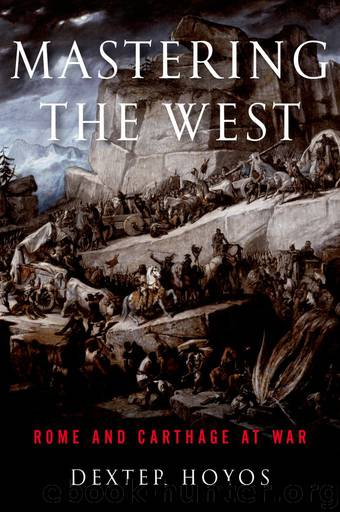Mastering the West by Hoyos Dexter;

Author:Hoyos, Dexter;
Language: eng
Format: epub
Publisher: Oxford University Press
Published: 2014-01-15T00:00:00+00:00
10
CARTHAGE IN RETREAT: 210–206
NEW CARTHAGE, 209
Claudius Nero was a stopgap, even if an effective one. He was probably astonished nonetheless to learn, late in 210, who would be his long-term replacement. With an imposing range of possibilities to choose from—that year’s consul Marcellus, his colleague Valerius Laevinus, Fulvius Flaccus the surviving conqueror of Capua, not to mention Nero himself (in situ at that)—the citizens in the Comitia Centuriata voted for a young man who put himself forward even though he had held no magistracy higher than aedile. He was Publius Cornelius Scipio, aged twenty-five, the elder son of the dead proconsul, his namesake. He had served with his father and Sempronius Longus in 218, was at Cannae two years after, had been aedile in 213, and no doubt had seen much military service overall. Even so, appointing him to take charge of the precarious Roman position in northern Spain—and removing a steady though unspectacular older commander—was the Romans’ biggest gamble of the entire war.
All that young Publius had to recommend him was his kinship with the slain Scipios, which would lend him some influence with northern Spaniards (though it proved useless with the Ilergetes and their tirelessly pro-Punic lords Indibilis and Mandonius). Maybe some voters felt too that his father and uncle had turned Spain into a kind of Scipionic preserve—scarcely a typical Roman attitude to military appointments, all the same, nor a strong argument in logic. For the gamblers to be not the Senate but the citizens in the Comitia was as novel as to choose a twenty-five-year-old, whether or not they were swayed by a knot (not easily identifiable) of leading men. Certainly a couple of precedents from the past could be had: the fourth-century heroes Manlius Torquatus and Valerius Corvus had served in high office illustriously at similar ages (Valerius was first consul reportedly at twenty-three, in 348). But Scipio was unique: currently a private citizen and mere ex-aedile, he received imperium as a proconsul. As colleague he was given an ex-praetor, the hardly more eminent Marcus Junius Silanus, who the year before had commanded forces policing Etruria. Silanus’s formal imperium may have been equal to Scipio’s—the evidence is not clear—but in practice he was the younger man’s subordinate. Silanus proved a reliable journeyman, but Scipio’s most trusted officer was his close friend Gaius Laelius.
No doubt Scipio had strong and influential senior supporters, but it is easier to surmise whom his election annoyed—Nero for a start and probably too Fabius Maximus (who viewed Scipio as a dangerous hothead even five years later). The able consul Laevinus is not likely to have been delighted either. In a puzzling tussle with the Senate earlier in 210 he had refused to summon the Comitia to choose a dictator for supervising the coming elections, perhaps disgruntled that the choice was being left to voters instead of to the consul (an innovation dating to 217 for Fabius). When the task was transferred to his colleague Marcellus, the voters elected Fulvius Flaccus dictator, and as his master of horse Fulvius chose Scipio’s great friend P.
Download
This site does not store any files on its server. We only index and link to content provided by other sites. Please contact the content providers to delete copyright contents if any and email us, we'll remove relevant links or contents immediately.
| Africa | Americas |
| Arctic & Antarctica | Asia |
| Australia & Oceania | Europe |
| Middle East | Russia |
| United States | World |
| Ancient Civilizations | Military |
| Historical Study & Educational Resources |
The Mysteries of Mithra by Cumont Franz(1352)
The Fall of Carthage by Adrian Goldsworthy(1301)
Sacred Britannia: The Gods and Rituals of Roman Britain by Aldhouse-Green Miranda(1146)
Letters from a Stoic (Classics) by Seneca(1028)
The Ghosts of Cannae: Hannibal and the Darkest Hour of the Roman Republic by Robert L. O'Connell(978)
Selected Political Speeches by Marcus Tullius Cicero(971)
The Satyricon by Petronius(970)
Fall of the Roman Republic (Penguin Classics) by Plutarch(962)
The Poison King: The Life and Legend of Mithradates, Rome's Deadliest Enemy by Adrienne Mayor(959)
Rubicon: The Triumph and Tragedy of the Roman Republic by Tom Holland(938)
Rome's Gothic Wars: From the Third Century to Alaric by Michael Kulikowski(932)
Hadrian and the Triumph of Rome by Everitt Anthony(880)
In Defence of the Republic by Cicero(862)
The Roman History by Cassius Dio(862)
Delphi Complete Works of Cicero by Cicero(815)
Letters from a Stoic by Seneca(808)
The Spartacus War by Strauss Barry(793)
Marcus Aurelius by John Sellars(792)
The Twelve Caesars (Penguin Classics) by Suetonius & Robert Graves(769)
